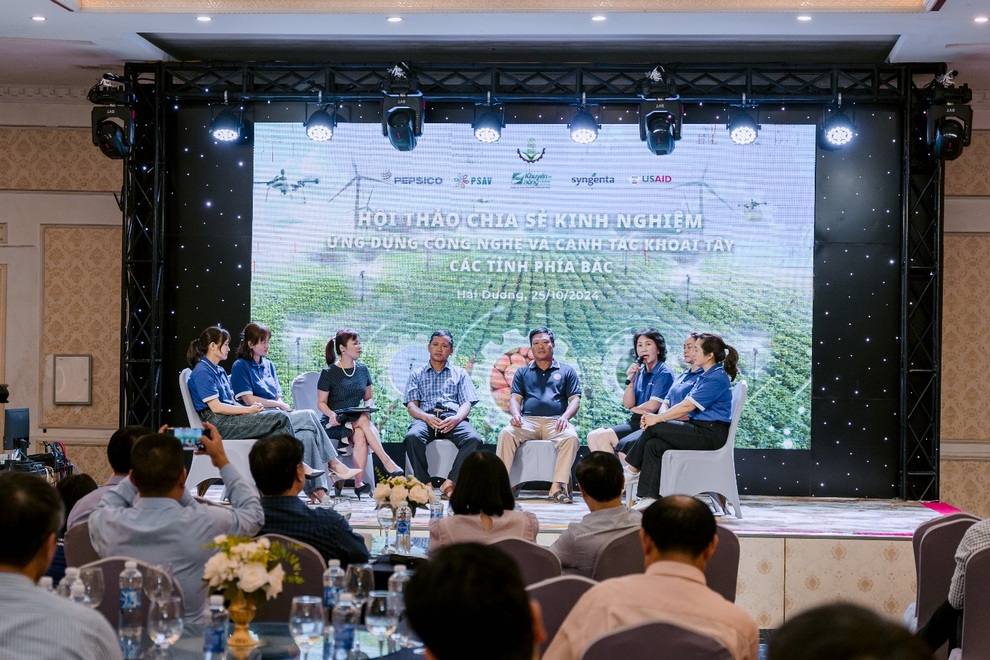- Giới thiệu
- Nhóm Công tác
- Tin tức
- Thông tin về FTA
- Tài Liệu
- Sự kiện
- Liên hệ
Expanding the model of sustainable high-yield potato cultivation in the Northern provinces
Expanding the model of sustainable high-yield potato cultivation in the Northern provinces
In the 2024-2025 Winter-Spring crop, PepsiCo will continue to coordinate with Syngenta and partners in the potato value chain to implement a sustainable potato production model in the northern provinces with a total expected area of 320 hectares.
On October 25, the PPP (public-private partnership) working group on vegetables and fruits, including the National Agricultural Extension Center representing the public sector, PepsiCo and Syngenta representing the private sector, organized a workshop to share experiences in applying technology and cultivating potatoes in the northern provinces. The workshop aimed to share experiences in applying technology in potato cultivation, discuss PPP cooperation contents to develop a sustainable, high-yield potato value chain model in the northern provinces in 10, and at the same time kick off the 2025-2024 Winter-Spring potato crop.

Experience in successfully implementing the model in the Central Highlands
Since 2008, PepsiCo Foods Vietnam has implemented the first crop in Lam Dong to develop domestic potato raw material areas with the goal of gradually increasing the proportion of local supply and reducing import sources.
From 4 farming households with an area of 27 hectares in the first year of implementation and achieving an initial yield of 8 tons/ha, by 2024, more than 1.500 farming households had participated with a total area of nearly 1.700 hectares and an average yield of 24.6 tons/ha, higher than the average in Thailand, Indonesia... In particular, there was a household that achieved a yield of 54 tons/ha.
Recognizing the benefits of the value chain in the potato industry, since 2019, PepsiCo has partnered with partners, including Syngenta - co-head of the PPP Working Group on Fruits and Vegetables, along with the National Agricultural Extension Center, Yara, Mimosatek, Netafim_Khang Thinh, USAID Resonance-GDA project and Care-She Feeds The World (SFtW) project to implement a sustainable potato production model using high technology in the Central Highlands provinces.
With outstanding advantages, this model has been researched, evaluated and officially expanded by PepsiCo to the Northern provinces from the 2024-2025 Winter-Spring crop.
Sharing about the expansion plan, Mr. Nguyen Kim Hanh, Director of Agriculture of PepsiCo Vietnam said: “Expanding the potato value chain model to the North helps to realize PepsiCo's goal of shifting raw material areas, aiming to ensure 100% of the supply of qualified raw materials for the new factory in Ha Nam With an expected capacity of more than 20.000 tons of snacks/year, increasing the export value of fresh potatoes to the international market, promoting Agriculture cyclic".
Ready for the 2024-2025 Winter-Spring potato crop
In the northern provinces, potatoes play an important role in the structure of winter and spring crops. According to the Ministry of Agriculture and Rural Development, the annual winter crop production area is about 400 thousand hectares, of which potatoes range from 15-18 thousand hectares, with an output of 250-320 thousand tons. However, with favorable land and weather conditions, the potential for potato production in the northern provinces is estimated at about 150-200 thousand hectares/year.
In the 2024-2025 Winter-Spring crop, PepsiCo continues to coordinate with Syngenta and partners in the potato value chain to implement a sustainable potato production linkage model in the provinces of Hai Duong, Thanh Hoa, Bac Giang, Thai Binh, Vinh Phuc …, with a total expected area of 320 hectares including a pilot model applying high technology on an area of 23 hectares.
Seeing the effectiveness of the pilot model and confidently participating in the official Winter-Spring crop 2024-2025 with an area of 38 hectares, Mr. Tran Danh Tang, Chairman of Thai Tan Cooperative in Hai Duong said: “When participating in the model, people no longer have to worry about potato output. People also understand more about their role in sustainable agricultural production, have awareness of safe farming and environmental protection. I hope this model will be replicated in many localities so that people have the opportunity to access effective and safe farming methods.”
In addition to access to advanced farming techniques, safe and responsible use of fertilizers and pesticides, potato farmers are also guided to improve their financial management and safe production capacity. PepsiCo also supports farmers in applying digitalization in agriculture such as visiting fields with drones, managing cultivation, adjusting irrigation water right on the phone application...
In the current trend of green and clean agricultural production, this model is expected to contribute to reducing emissions, protecting the environment, adapting to climate change, realizing the plan to develop a sustainable potato industry, and joining hands to build a green future for the agricultural sector
Tin liên quan
PSAV Attends the 30th Anniversary Celebration of Cargill Vietnam2025/10/23
Plant health management helps increase coffee yield up to 15%2025/10/16
An Giang to host 2025 OCOP forum for sustainable development2025/09/25
Viet Nam and France foster cooperation on blue economy and sustainable environment2025/09/29
Agriculture and Environment exhibition ready for National celebration2025/08/27



 Điều lệ hoạt động
Điều lệ hoạt động



















































